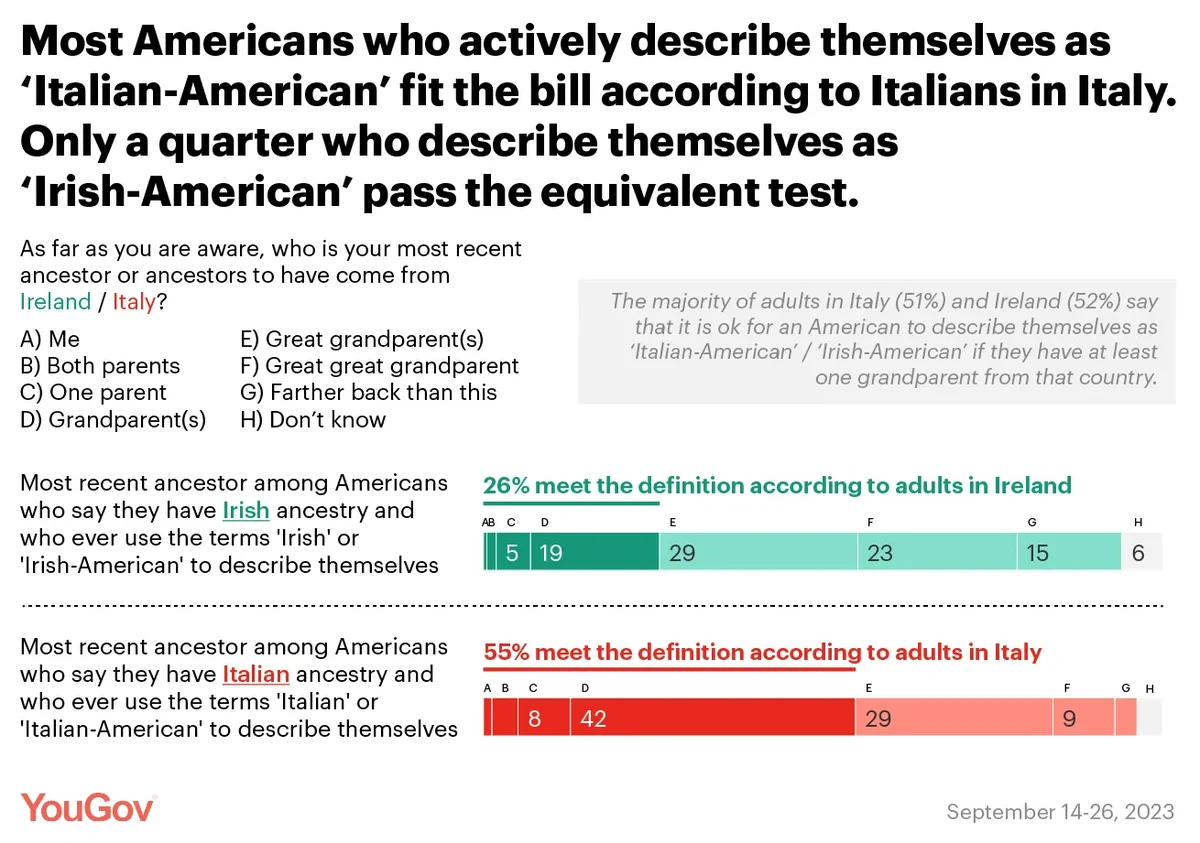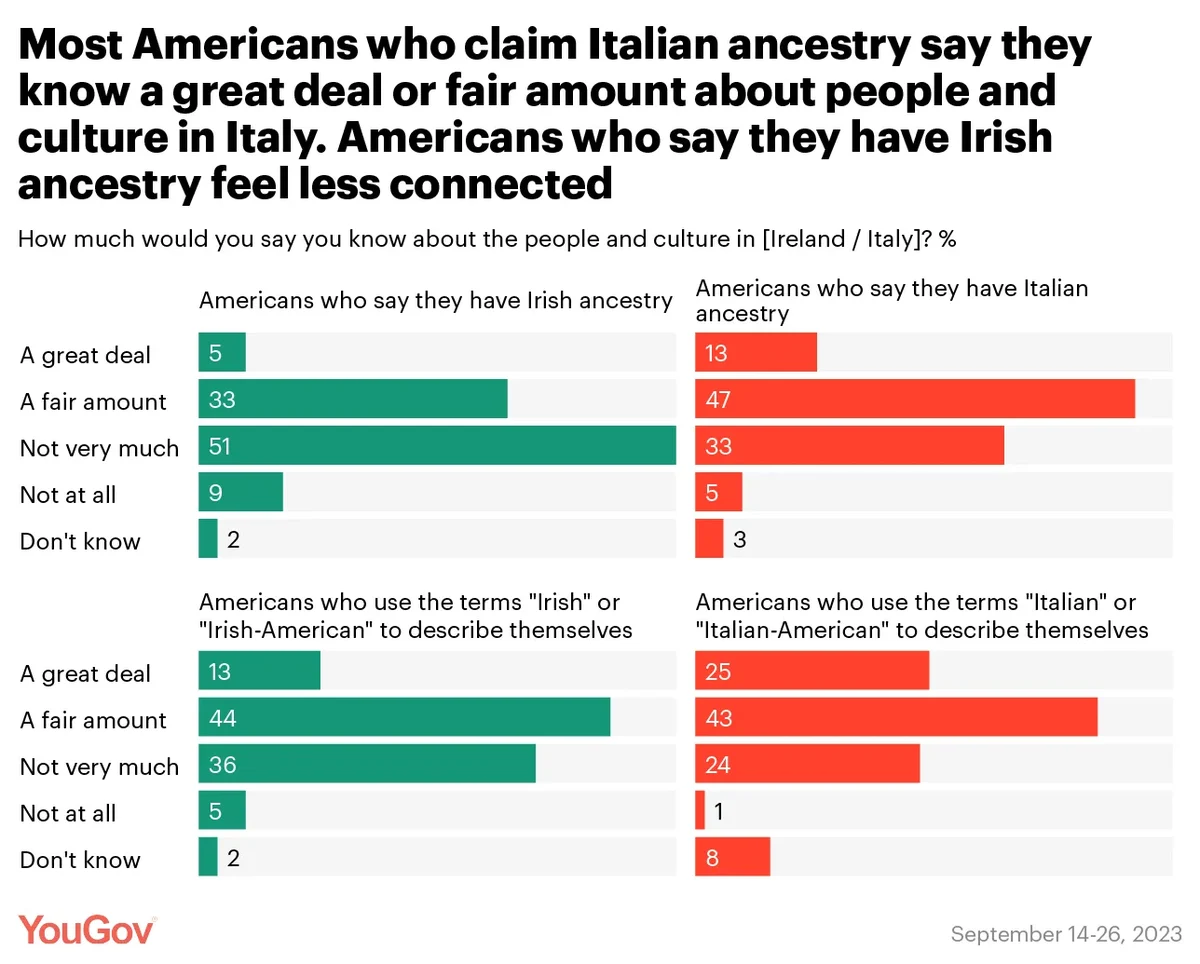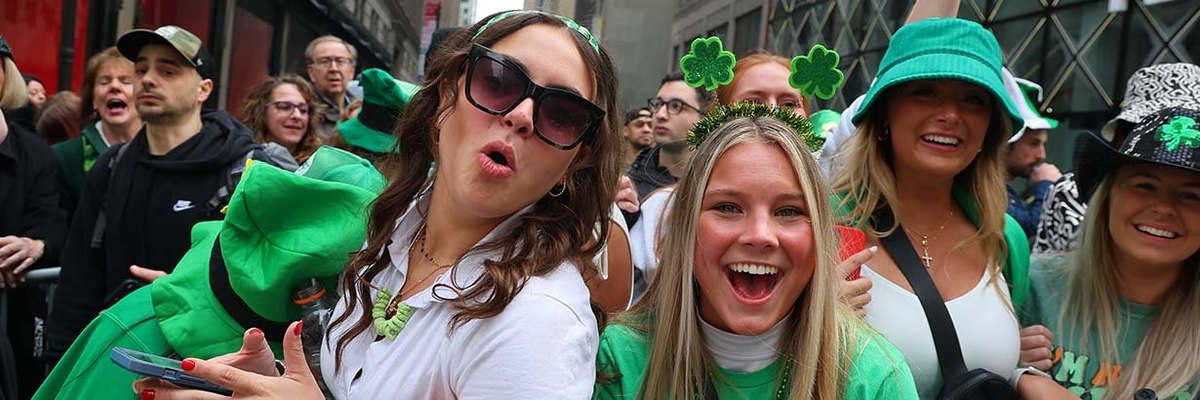YouGov examines how attached Americans are to their Irish and Italian heritage, and how much they and their cousins in the mother countries feel they have in common
In a nation founded by immigrants, many Americans proudly hold on to a connection with their ancestors’ national origins. Perhaps the two most prominent examples are the descendants of Irish and Italian immigrants.
This has not escaped the notice of those in the mother countries, to whom the connections may often seem convoluted. As a journalist for the Irish Mirror casually writes:
"We've all seen it happen at some stage. If you're ever actually in America and someone picks up on your Irish accent, then you'll get a tale about how their great-grandfather's had a brother whose dog had a cousin whose goldfish was from Leitrim, therefore they themselves are Irish."
Indeed, pejorative terms such as “plastic paddy” exist to describe people making what appear to be tenuous claims to Irish identity.
But how many Americans who say they have Italian or Irish ancestry ever make such claims? And in any case, how many people in Italy and Ireland actually disagree with these claims in the first place?
Now a new YouGov study of more than 1,400 Americans who say they have Irish ancestry and more than 500 who claim Italian ancestry examines this, as well as how strongly people hold their heritage, how much they feel like they know about Irish and Italian culture, and how similar they consider themselves to be to their European counterparts.
For their part, we also asked 1,000 adults in both Italy and Ireland for their take on when their national label can be applied to American citizens, and how they see their distant cousins from overseas.
How many Americans with Irish or Italian ancestry actually call themselves Irish or Italian?
Half of Americans with Italian ancestry (53%) say they describe themselves as "Italian" or "Italian-American." Three in ten with Irish ancestry (29%) say likewise.
Nevertheless, this means that half of Americans with Italian ancestry and seven in ten with Irish ancestry don’t use such terms to describe themselves.
Nor does applying one of those labels to yourself mean that it is an identity people are particularly forthcoming about. When asked how those terms come up, around two-thirds who describe themselves as Irish/Irish-American (67%) or Italian/Italian-American (64%) say that it’s only something they say when someone specifically asks them about their ancestry.
Only around three in ten say that their Irish (27%) or Italian (31%) ancestry is something they “actively feel, think about, and/or talk about.”
Combining these figures suggests that just 8% of those claiming Irish heritage and 16% of those saying they are descended from an Italian family are likely to be particularly forthcoming about that identity.
So when can you describe yourself as Irish or Italian, according to the Irish and Italians?
When it comes to how recent an ancestral connection is required, the Irish are more permissive than Italians.
In terms of Americans being able to call themselves ‘Irish’, the requirement set by Irish people in Ireland tends to be that you must have at least one Irish parent – 47% say it is OK for those with an Irish parent to call themselves ‘Irish’ compared to 39% who say it is not.
Among Italians in Italy, however, Americans can only describe themselves as ‘Italian’ if they have two Italian parents. Half (52%) say this would be OK, compared to only 37% if they have one Italian parent.
When it comes to describing yourself as "Irish-American" or "Italian-American," the requirement among both nations seems to be set at the grandparent level. About half in each country say it is OK for an American with at least one Irish or Italian grandparent to use the hyphenated identity, with about one-third saying this is not OK.
For those whose most recent relative is a great grandparent, Irish people would say "Irish-American" is an inappropriate term by 47% to 41%, while Italians feel likewise by 49% to 38%.
So how many Irish- and Italian-Americans fit the bill, according to their cousins overseas?
By the Italian public’s definition, a majority (54%) of Italian-Americans are using the term appropriately. The largest portion (42%) have an Italian grandparent, while 8% have an Italian parent and 4% have both parents.
Four in ten Italian-Americans (41%) are using the term outside of the boundaries set by Italian adults, including the 29% who have a great grandparent, 9% a great great grandparent, and 3% whose most recent Italian ancestor was farther back still.

By contrast, only a quarter (26%) of those who describe themselves as Irish or Irish-American can rightly use the "Irish-American" label according to Irish adults.
How important is their Irish and Italian ancestry to Americans?
So we’ve seen how widespread the "Irish" / "Italian" labels are among those with the relevant ancestry, but how important is that heritage to these groups?
The results show that those Americans with Italian ancestry tend to hold their heritage more dearly to them than those with Irish ancestry: (62%) with Italian ancestry say their Italian heritage is very or fairly important to them, compared to 40% of those with Irish ancestry.
For those who describe themselves as Irish/Irish-American or Italian/Italian-American, heritage is more important still.
Three quarters (75%) of the former group say their Irish heritage is important to them – as is the Italian heritage of 84% of those who describe themselves as Italian or Italian-American.
How much do those who claim Irish or Italian ancestry believe they know about those cultures?
In 2016, the Irish Times ran a series of interviews with Irish-Americans about how they see Ireland, describing their views as “a mix of confusion and piercing insight.” So how well connected do Americans who claim Italian and Irish ancestry consider themselves to be to their mother countries?
Overall, only 38% of Americans who say they have Irish ancestry say they know “a great deal” or “a fair amount” about the people and culture in Ireland. Half (51%) say they don’t know very much, and 9% admit to knowing nothing at all.
Americans with Italian ancestry are much more likely to think they have a decent grasp on Italian people and culture, with 13% saying they know a great deal and 47% a fair amount. A third (33%) say they don’t know much, and 5% nothing at all.

Perceived expertise is higher still among those who actively describe themselves as Irish or Irish-American, with 57% believing themselves to know a great deal or fair amount, and stands at 73% among those branding themselves Italian or Italian-American.
While these groups may consider themselves to be knowledgeable about their mother cultures, their overseas counterparts are sceptical. Most Italians in Italy (61%) and Irish people in Ireland (55%) tend to think that Americans who celebrate their ancestry from those nations have an inaccurate view of their national people and culture.
How much do Americans with Irish and Italian ancestry think they have in common with those from the mother country? And do Italians and Irish people feel the same way?
Americans with Irish and Italian ancestry hoping to feel some form of reciprocal kinship with their counterparts in Europe will be pleased to hear that many there do consider themselves to still have things in common with the descendants of those who left the continent years ago.
Most Americans with Irish ancestry (59%) think that Americans with Irish heritage have a great deal or a fair amount in common with Irish people in Ireland, and it's 75% among Americans who specifically describe themselves as Irish or Irish-American.
For their part, 55% of Irish people believe likewise. However, Irish people are far less likely to think that Americans in general have much in common with the Irish (30%).
When it comes to Americans with Italian ancestry, 61% see similarities between Italian-descended Americans and Italians from Italy, and that's 68% among those who actively describe themselves as Italian or Italian-American.
Around half of Italian adults (49%) agree that they still have things in common with Italian-descended Americans. However, when asked about similarities with Americans in general, a mere 14% of Italians believe the two peoples share much in common.
See the results for this YouGov poll in the U.S., Ireland, and Italy
Methodology: The U.S. poll was conducted on five separate 2023 surveys conducted September 14 - 20, September 15 - 20, September 18 - 21, September 19 - 23, and September 22 - 26. In all, the surveys included 1,454 U.S. adult citizens who say they have Irish ancestry and 566 who say they have Italian ancestry. For each survey, respondents were selected from YouGov’s opt-in panel using sample matching. A random sample (stratified by gender, age, race, education, geographic region, and voter registration) was selected from the 2019 American Community Survey. The sample was weighted according to gender, age, race, education, 2020 election turnout and presidential vote, baseline party identification, and current voter registration status. Demographic weighting targets come from the 2019 American Community Survey. Baseline party identification is the respondent’s most recent answer given prior to November 1, 2022, and is weighted to the estimated distribution at that time (33% Democratic, 31% Republican). The margin of error for the overall sample of Americans with Irish or Italian ancestry is approximately 1.8%.
The Italy poll was conducted on June 27-28, 2023 among a nationally representative sample of 1,026 adults in Italy. The sample was weighted according to gender, age, and geographic region.
The Ireland poll was conducted on July 13-18, 2023 among a nationally representative sample of 1,009 adults in Ireland. The sample was weighted according to gender, age, and geographic region.
— Carl Bialik, Taylor Orth and Luca Mapelli contributed to this article













